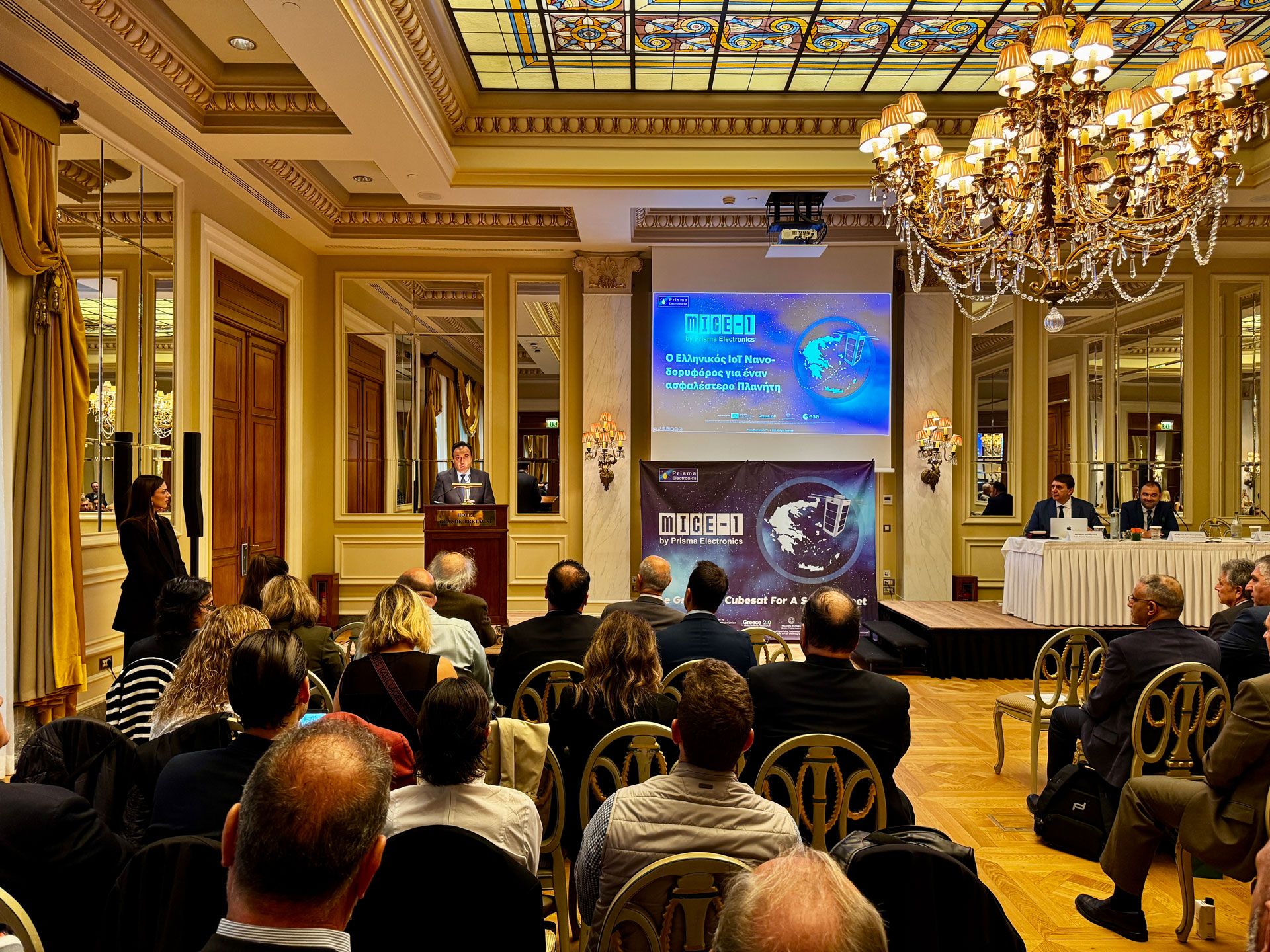Greece on a new trajectory: Presentation of the first Greek IoT nanosatellite MICE-1

Prisma Electronics SA's informative event at the Grande Bretagne Hotel was a great success, marking the upcoming launch of Greece's first commercial (IoT) nanosatellite, MICE-1, into space.
The event was attended by representatives of the State, the Armed Forces, the business and academic world, as well as journalists from the fields of technology, shipping, and economics, who were informed about the progress and significance of the project.
The event was welcomed by the Minister of Digital Governance, Mr. Dimitris Papastergiou, who, among other things, emphasized that:
"My presence at the MICE-1 event is tangible proof that Greek innovation knows no geographical boundaries. From Alexandroupolis to space, Prisma Electronics proves that the Greek periphery can play a leading role on the global map of technology and high-value industry."
Mr. Papastergiou then referred to the national microsatellite program, emphasizing its importance in the field of cutting-edge technologies. Greece must continue to invest in space, establishing itself as a country capable of producing cutting-edge technologies. He congratulated PRISMA on its efforts and expressed his full support for its vision.
Mr. Athanasios Potsis, President of ΕΒΙΔΙΤΕ, who referred to the importance of cooperation between the state, industry, and the academic community for the development of Greek space technology, as well as Mr. George Christopoulos, COO of Laskaridis Shipping, who emphasized the strategic value of LAROS for shipping in particular, as he pointed out, today when Greek shipping faces significant technological, geopolitical, and environmental challenges. MICE-1 is key to the development of ocean-going shipping.
The keynote speakers at the event were Mr. Frédéric Rouesnel, Program Manager at the European Space Agency (ESA), who presented the European perspective and ESA's participation in the project, Mr. Christos Giordamlis, CEO of Prisma Electronics, who highlighted the company's role in the Greek space ecosystem, and Mr. Stefanos Chartomatzidis, CCO of the LAROS system.
Mr. Chartomatzidis analyzed the practical applications and prospects opened up by MICE-1 in maritime technology and the importance of integrating LAROS into a satellite network.
Next, the CEO of Prisma Electronics, Mr. Christos Giordamlis, after thanking the state and the academic community, emphasized that: "Today's event marks a historic milestone for Greek space technology. MICE-1 is not just the first Greek commercial nanosatellite; it is proof that Greece can design, manufacture, and launch satellites with practical applications in the market and in environmental protection.
The development and construction of MICE-1 in Alexandroupolis, in collaboration with leading international partners, opens new horizons for sustainable shipping, innovation, and technological self-sufficiency in the country. We are proud to connect the Greek business and technology community with space and actively contribute to the creation of a dynamic ecosystem for young scientists and Greek companies.
We hope, Mr. Giordamlis continued, that the strategy outlined by the government for Greece's space presence will continue with new resources and consistency over time.
During the event, the technical, environmental, and business dimensions of the MICE-1 project (Marine Identification and Communications Cubesat) project were presented, as well as how the satellite will contribute to green and sustainable shipping by enhancing the LAROS system, Prisma Electronics' innovative platform that already supports hundreds of ships worldwide.
The presentations were followed by a Q&A session and open discussion with journalists, during which company executives answered questions about the satellite's operation, cooperation with the European Space Agency, and the broader contribution of the project to the National nano-Satellite Program.
The launch of MICE-1 is expected to take place in mid-November, marking Greece's entry into the new era of nanosatellite applications and confirming Prisma Electronics' contribution to the global innovation map.